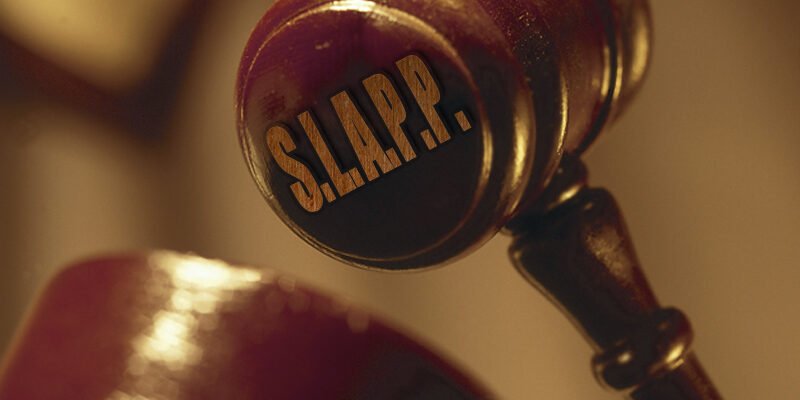Read Part 1: Defamation Lawsuits Can Be Weaponized Tools Of Censorship
Read Part 2: Jim Worthington And Clarice Schillinger Target Their Critics With Defamation Lawsuits
In the first two parts of this series, we highlighted some of the “dirty secrets” of First Amendment litigation.
1) Defamation cases are hard to win, but relatively easy to file.
2) In the current legal framework in Pennsylvania, you only have as much free speech as what you can afford to pay in legal fees.
3) You can win a defamation case, but still lose everything.
4) Publicity around a defamation case can intimidate others from participating in protected speech.
These secrets demonstrate how defamation cases can abuse the civil litigation system by effectively using the civil courts to censor speech protected by the First Amendment. To offer a more vigorous defense of speech in this context, other states have passed what are commonly known as “anti-SLAPP” laws.
What is a SLAPP suit?
A SLAPP is a civil lawsuit that is intended to censor, intimidate, and silence critics by burdening them with the overwhelming costs of litigation until they abandon their criticism or opposition. The person bringing the SLAPP does not necessarily care about prevailing on the merits of the claim. Their goals instead are accomplished if their targets succumb to fear, intimidation, mounting legal costs, and exhaustion and eventually abandon their criticism. As a bonus, if the SLAPP plaintiff can capture the attention of the media or spread the news of the lawsuit among the targets’ circle, it can intimidate others from entering into the debate.
According to one court, SLAPPS are “generally meritless suits brought by large private interests to deter common citizens from exercising their political or legal rights or to punish them for doing so.” SLAPPs are one of the tools available to the powerful, wealthy, and well connected to effectively muzzle public debate by exposing their critics to expensive and protracted litigation. Those who file SLAPPs use the lawsuits as a blunt instrument to suppress political claims and public debate. The plaintiffs in these cases use litigation to silence their targets, with minimal concern over the substantive outcome.
SLAPPs are civil lawsuits initiated by private parties and not by the government, and they are typically filed against news organizations and their journalists, private individuals, or non-governmental agencies that communicate on issues of public interest or concern. Examples include: environmental concerns, neighborhood disputes, dissatisfied consumers, tenant disputes, opponents of development interests, and, of course, political rivals.
How to Identify a Probable SLAPP Suit
The typical SLAPP suit alleges claims of defamation, or slander for spoken words and libel for written words. The suit is also likely to allege damage to reputation caused by being placed in a false light, a tort that stems from the right to privacy. If the disputed words were directed at a corporation or business, SLAPPS will often include claims of disparagement, trade libel, or tortious interference with business relations, alleging that the business lost actual or prospective customers. In the vast majority of these cases, a homeowner’s insurance policy will not provide insurance coverage for defending or settling these claims. If you are facing these claims, you will be dipping into your own personal bank account to fund your defense.
What About My Right to Free Speech?
As discussed in Part 1, despite the availability of strong legal defenses based on First Amendment free speech protections, there are several reasons why SLAPPs are devastatingly effective at silencing criticism or advocacy.
Unequal Access to Justice
SLAPP filers usually have the advantage of familiarity with the judicial system. They are typically litigants who know lawyers and have worked with law firms in other contexts – such as for business transactions, or contract disputes. Politicians are also often attorneys or run in the same close social and business circles as other lawyers and judges. In one such case, my client witnessed the judge hug the defamation plaintiff before a hearing and help her with her coat. Needless to say, this did not inspire faith in the impartiality of the court’s rulings. Unlike the other side, my client did not have a prior relationship with lawyers, or judges, and this is fairly typical.
Unequal Financial Resources
The side that can afford to fund lawyers to commence and continue litigation without the fear of financial ruin has a distinct advantage. The overwhelming cost of litigation is a significant deterrent to anyone who cannot afford to spend hundreds of thousands of dollars on lawyers. As noted above, these claims are difficult to win for plaintiffs, but easy to file. Many of these cases are won by default because ordinary citizens simply cannot afford to fund a defense. If the choices are to either find $25,000.00 to cover the cost of a retainer to hire a lawyer for the first few months of the litigation, or, capitulate and withdraw the alleged defamatory statement, most sensible people would choose to capitulate.
It is no secret that money provides a devastating advantage in civil litigation. Consider lawsuits as wars between parties that are waged in the courtroom. Using that analogy, the side with more money will have air superiority and can dictate the terms of almost every battle, and there will be many in the course of any given case. One advantage is the ability to take risks by asserting dubious legal claims that rest on shaky foundations of fact or law. Another is the ability to file and respond to a variety of motions. Still another is the ability to engage in detailed and often intrusive civil discovery practice by hiring data forensic experts to collect information stored digitally. The more money available to a party, the more options they have in litigation. In a SLAPP suit, the side with more money and access to lawyers is, more often than not, the party suing – not the ones facing the lawsuit.
The side with more money can also pursue appeals, regardless of risk. Winning before the trial court merely ends the first phase. The party that loses can appeal as a matter of right to the Superior Court. The briefing before the appeals courts can be time consuming and expensive, as the appellate rules are complex and full of pitfalls for inexperienced practitioners. The Superior Court can either affirm the dismissal, or reverse and send the case back to the trial court. Even if the Superior Court affirms, there is still an appeal to the Supreme Court of Pennsylvania. Although the Supreme Court has the privilege of deciding which cases to accept on appeal, the parties are still obliged to file their briefs to the certiorari petition. If your case has reached this phase, you have likely been living with the threat of financial ruin for seven years or longer.
I had one client describe the defamation lawsuit she faced as a malignancy.
No Right to Legal Representation
Unlike criminal charges, when you are faced with a civil claim like libel, there are no court appointed lawyers who will protect your right to free speech. It is also unlikely that you will be able to convince reputable civil rights organizations like the American Civil Liberties Union (“ACLU”) to help defend against the claims. Although the ACLU has lawyers and some resources available for this purpose, given its limited resources, it generally chooses to enter into the fray only when matters are up on appeal and have the chance of becoming precedential.
Legal Procedural Rules Favor the SLAPP Filer
Civil lawsuits in general are very difficult to dismiss prior to the conclusion of the “discovery phase” – where most of the expense in the case is incurred. A party usually starts a lawsuit by filing a formal complaint with the court and serving it on their adversary. A decent lawyer will generally know how to plead a cause of action so that it survives an initial dispositive motion. When considering a motion to dismiss (called “preliminary objections” in Pennsylvania), the court is required to accept as true every factual allegation in the complaint. For example, if a defamation plaintiff alleges that her reputation was ruined because of a publication’s false statements, a court has to accept that as true – regardless of whether it actually is true. The parties then proceed to discovery to gather evidence from documents and witnesses to test the veracity of the allegations.
Once all that evidence is gathered and the discovery phase closes – typically two or three years after commencement of the lawsuit – the parties can again seek judgment on their claims, either through a jury trial or through further motion practice. Given the large civil caseloads handled by most county judges, it is often predictable that any given defamation case will not get the scrutiny it deserves until after the close of the discovery phase. This means that someone facing these claims will need to live with the threat of a verdict that could bankrupt them for at least two years before getting a real shot at dismissal.
Living Under the Threat of Financial Ruin
SLAPPs can also inflict psychological trauma on the targets. Imagine having to face the prospect of a multi-million dollar verdict over a seven-year period. Imagine being confronted with motion after motion, requiring you to engage in helping both prepare and fund effective responses. These lawsuits turn the civil court system into a devastating psychological weapon. They not only sideline the respondents by distracting them with the actual litigation, but have an added benefit of creating strong disincentives for anyone else thinking of bringing public attention to the issue.
There are significant social costs associated with SLAPPs, which, by their nature, aim to chill debates on public and political issues of concern. Once you are hit with a SLAPP suit, you are far less likely to engage in public debate. It is natural to withdraw from the arena as a self-protective measure. SLAPPS thus imperil the right of free speech, and hinder the work of news organizations, consumer advocates, as well as public advocates who play a crucial watchdog role in our democracy.
For each of these reasons and others, Pennsylvanians are in desperate need of protection from SLAPPs. Pennsylvania must join the 30 other states that have attempted to limit the damage caused by SLAPPs.
There are three sensible ways to turn the tide.
Not every problem we face in our civil society has a readily-available solution. Fortunately, other states, led by California over twenty years ago, have passed highly-effective anti-SLAPP laws designed to protect their citizens’ rights to free speech. All Pennsylvanians, regardless of political affiliation, would benefit from similar legislation.
To be effective, the anti-SLAPP laws must address each of the dirty secrets we’ve identified.
Make claims of defamation as hard to file as they are to win
As we discussed, currently in Pennsylvania, it is far too easy to sue someone for defamation and keep that case alive for years. A good anti-SLAPP law similar to California’s would give the targets of a SLAPP suit an opportunity to file an “anti-SLAPP” motion very early in the case, sometime within the first 60 days. This will give courts an early procedural avenue to deal with these SLAPP suits, and quickly dismiss non-meritorious defamation claims.
An anti-SLAPP law should create a basic mechanism that permits defendants to file a preliminary motion designed to test the allegations in an accelerated and abbreviated fashion – prior to the expensive discovery phase. Most anti-SLAPP laws stay the expensive discovery phase until a judge determines whether the allegations have enough merit to risk undermining the publisher’s First Amendment rights to speech.
Equalize the Parties’ Access to Justice; Take Money Out of the Equation
In Pennsylvania, there are few (if any) incentives for lawyers to get involved on behalf of victims of SLAPPs. Any legislation must mandate an award of counsel fees should the judge determine that the lawsuit was a SLAPP suit. That step will encourage other advocates to get involved. Those with experience in the area typically represent the dwindling numbers of newspapers in the Commonwealth, work for private law firms, and are thus unlikely to offer pro bono defense work. Creating a mechanism that compensates victims of SLAPPs and punishes the filers by awarding attorneys’ fees will incentivize good lawyers to develop experience defending against SLAPPs.
A Win for Free Speech is a Win for All
As noted above, parties can lose defamation claims but still achieve their broader aims by effectively censoring their opponents through the highly effective threat of financial ruin. By shifting the financial cost of their lawsuits entirely to the SLAPP filers, the law can incentivize not only the targets to mount a vigorous defense, but also to publicize their legal victories. Currently, the law discourages any discussion of the lawsuits because any words used can be fodder for future defamation claims.
With good anti-SLAPP laws, if the target prevails in a SLAPP case by compelling the other side to pay all of the fees incurred in bringing the anti-SLAPP motion, it will encourage others to enter into the political arena. More importantly, providing a fee-shifting mechanism will deter the filing of SLAPP suits, as it has done in California, New York, and other states with similar laws.
Right to Immediate Appeal
Further protect victims of SLAPPs by providing a right of immediate appeal from the denial of a motion to dismiss the case. Trial judges may not be as familiar with defamation claims or the Constitutional defenses that should bar those claims. Similarly, the trial court judges may be overly familiar with the lawyers – who have frequent appearances before that court – or parties filing the SLAPP suits, and may give their claims the benefit of the doubt by exercising discretion in their favor. The goal here is to have an appellate court review the determination of the trial judge before the case moves into expensive and intrusive discovery.
What is at Stake
When New York passed its anti-SLAPP statute, it declared: “the rights of citizens to participate freely in the public process must be safeguarded with great diligence.” New York was concerned that “the threat of personal damages and litigation costs can be and has been used as a means of harassing, intimidating or punishing individuals, unincorporated associations, not-for-profit corporations and others who have involved themselves in public affairs.”
Speech cannot be considered “free” if you can be financially penalized at the whim of someone who disagrees with your words. Stripped of the veneer of a formal civil action, being sued for defamation is like receiving a very expensive ticket that you must pay in order to vindicate yourself.
Imagine if someone issued you a $500.00 fine every time they disagreed with your words or found them personally offensive. You would rightly protest that your speech was protected under the First Amendment and that the fine was an unlawful violation of your constitutional rights. A SLAPP suit is essentially the same thing – except you are being penalized significantly more than $500.00. Each defense will cost you tens of thousands or hundreds of thousands of dollars.
Eventually, you will lose everything. You will not be able to afford to speak or publish. You will self censor and withdraw from the political arena.
This is how, despite the vigorous protections of the First Amendment, our right to free speech can effectively be censored.
Everyday Pennsylvanians who have answered the call of democracy, and entered into the public square face these threats today.
And this highlights why we so desperately need vigorous anti-SLAPP laws in Pennsylvania. Our legislature in Harrisburg must do more to protect us from these abusive lawsuits.






